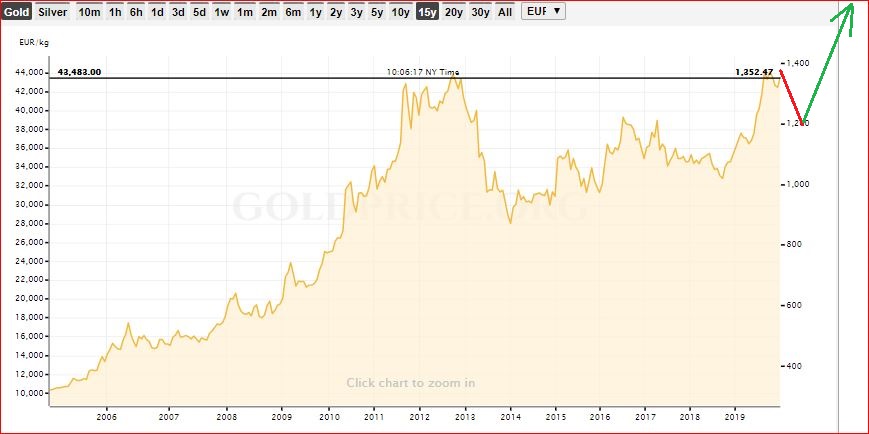Re: L'oro un difensivo? Nah ... ¶
By: gianlini on Domenica 26 Gennaio 2020 23:32
Xtol, peccato che tu non apprezzi gli articoli che posti, citandone aspetti secondari o solo parziali, quando contengono informazioni ben più interessanti.
Sempre sulla discussione della limitazione dell'uso di contanti, ecco cosa scrive l'interessante articolo che hai postato (le code ai botteghini sono la parte folkloristica di scarso interesse).
In sintesi, il governo tedesco spingerebbe i tedeschi a non comprare oro, per spingere i propri concittadini a spendere ed indebitarsi di più. Forzare l'uso di strumenti elettronici non ha a che fare tanto con la possibilità di fare dei prelievi forzosi, quanto quella di ottenere informazioni molto dettagliate sulle abitudini di spesa dei cittadini, e spingerli al consumo che mette in moto l'economia.
Our third theory on why Germany wants to limit gold ownership through lowering the anonymous transaction threshold is a little conspiratorial, but nothing we’re about to share is untrue. It can all be fact-checked, and we invite you to do so.
Since the 1970s and ‘80s, the banking system has become reliant on debit and credit cards. Many years ago I wrote an article titled ‘Ignorance is a Temporary Condition’ that explained how the switch from cash to credit has resulted in over-spending and high levels of consumer indebtedness. While the figures in the article are dated, its salient points still ring true, and bear repeating:
In the early 1970s, a nationwide electronic funds transfer system was envisioned. The system would use individualized electronic identification cards and digitized bank accounts with merchants connected to them by telecommunication links.
But it wasn’t until the 1990s that credit and debit card use really caught fire.
Is going cashless a good thing? Not for most people, we tend to spend more when we buy things with a credit or debit card instead of cash:
Paying with cash, actually pulling the money from a wallet or purse is a vivid enough action to elicit a negative, and in some consumers a mildly painful, psychological reaction that’s absent when either a credit or debit card transaction takes place.
Along with incentivizing card holders to spend freely, inconsequentially, the inception of debit cards provided banks, businesses and government agencies with an endless trail of data from which to track card holders’ spending habits. It was the beginning of the surveillance state around which George Orwell constructed his book ‘1984’.
Indeed, governments are constantly implementing new ways of restricting the use of cash and invading citizens’ privacy.
A 2019 article in creditcards.com describes how owning a credit card is like having “an electronic bug in your wallet.” That’s because each time a purchase is made on debit or credit, a record of that transaction is logged into a database collected by the credit card issuer.
Banks use this data to determine a card-holders credit-worthiness, giving them information on raising credit card interest rates or reducing credit limits.
Mining card issuers’ data also gives banks a means of fraud detection, turning over information to law enforcement, and the most insidious - marketing. According to the article this is done by tracking the “merchant marketing code” (MCC), a four-digit number that denotes the type of business. MCCs can be used for example to restrict health-care spending on health care-related credit cards, or to prevent employees from abusing company credit cards.
The purchasing information is used to build a spending profile of the cardholder which is either used by the card issuer, say to up-sell the cardholder with additional banking products, or is sold to advertising firms, which bombard the cardholder with digital advertising.
In this day and age of smartphones, banks have also reportedly started tracking customers’ cell phone locations in order to crack down on fraud - ie. if a transaction takes place away from a cardholder’s phone, there is a higher likelihood the purchase is fraudulent. The benefit of reducing fraud and its associated costs to credit card companies must be weighed against the invasion of privacy that occurs knowing that your bank is aware where you are and what you are buying at any given moment.
Gold purchasers go “off the grid” in that they are independent of this type of invasive surveillance. It makes sense then that the German government, likely pressured by the banks, would take steps to restrict gold ownership.
There’s also the idea that banks, and governments, like consumers to be in debt. In the US consumer spending accounts for 70% of the economy, so increasing spending in as many ways as possible clearly benefits the government, both in terms of higher revenue from sales taxes, and stimulating the economy through purchases of more goods and services.
Governments reward mortgage holders by allowing them to deduct mortgage interest on their taxes. Businesses that take out loans to purchase equipment for “capital improvements” can also take a tax deduction from the interest.
Also consider, the Federal Reserve favors inflation to deflation, because higher prices, and spending, mean the economy is growing.
Spending more on credit cards, and mortgages, of course is great for banks and other financial institutions, which collect more in interest and payments.
The 2008-09 financial crisis boiled down to a crisis of mortgage debt, with deregulated banks accepting too many loans from high-risk homeowners who should never have been granted these loans.
In North America particularly we have become a society of spenders and debtors, mentored by the worst role model one can imagine, the US government which currently has a national debt of $23 trillion and counting.
Last edited by: gianlini on Domenica 26 Gennaio 2020 23:33, edited 1 time in total.



